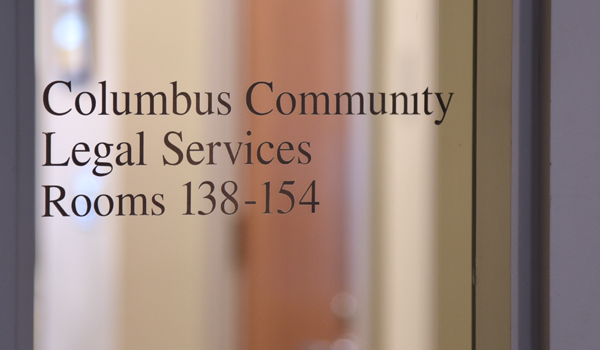 Three professors from Columbus Community Legal Services (CCLS)—the hub of clinical education at The Catholic University of America, Columbus School of Law—recently presented at the Association of American Law Schools’ 2025 Clinical Education Conference in Baltimore. Professor Catherine Klein and Clinical Assistant Professors Jocelyn Dyer and Christopher Ross helped lead panels that highlighted innovative approaches to running clinical programs and deepening how these clinics serve the community.
Three professors from Columbus Community Legal Services (CCLS)—the hub of clinical education at The Catholic University of America, Columbus School of Law—recently presented at the Association of American Law Schools’ 2025 Clinical Education Conference in Baltimore. Professor Catherine Klein and Clinical Assistant Professors Jocelyn Dyer and Christopher Ross helped lead panels that highlighted innovative approaches to running clinical programs and deepening how these clinics serve the community.
Founded in 1969 in response to the desire of students to develop their legal skills and to serve the legal needs of the surrounding community, CCLS provides free, high-quality legal services to needy individuals and families who live in the District of Columbia Metropolitan Area. Students who participate in CCLS are certified to practice as student attorneys and focus primarily on family and immigration law matters.
“Our clinical program provides students with hands-on experience while meeting critical legal needs in our community,” said Professor Klein, the Faculty Director of CCLS. “We’re proud to offer clinical education that prepares practice-ready graduates while serving our community’s most vulnerable residents.”
Ethical Considerations in Border Service Work
 Professor Dyer teaches CCLS’s Immigrant and Refugee Advocacy Clinic and, for the last several years, has led students on a Spring Break service trip to address the needs of immigrants and asylum seekers at the U.S.-Mexico border. Drawing on this experience, Professor Dyer participated in a panel at the AALS conference called Navigating the Border—Ethical, Existential, and Logistical Considerations in Law School Service Trips.
Professor Dyer teaches CCLS’s Immigrant and Refugee Advocacy Clinic and, for the last several years, has led students on a Spring Break service trip to address the needs of immigrants and asylum seekers at the U.S.-Mexico border. Drawing on this experience, Professor Dyer participated in a panel at the AALS conference called Navigating the Border—Ethical, Existential, and Logistical Considerations in Law School Service Trips.
The panel addressed the vital, yet complex, challenges of organizing student service trips to the U.S./Mexico border amid changing immigration policies. The session spoke to both the practical logistics of running such trips and the deeper ethical questions about “outsider” engagement in communities facing crisis. It also addressed the potential vicarious trauma that students might have when undertaking this kind of high-stakes work.
The session provided valuable guidance for other clinical programs considering similar initiatives, emphasizing the importance of thoughtful preparation, community partnership, and meaningful reflection to integrate these experiences into the broader clinical curriculum.
Bridging Administrative Excellence and Pedagogical Success
 Professor Ross, the Managing Director of CCLS, helped lead a session titled Bridging the Gap: Faculty and Clinic Manager Collaboration for Successful Student and Social Impact. The panel explored an often-overlooked but essential ingredient of a successful clinical program: the partnership between faculty and clinic managers or administrators. Co-led by faculty and clinic managers from several D.C.-area law schools, the session modeled a collaborative conversation that addressed the ethical, operational, and pedagogical complexities of clinic administration.
Professor Ross, the Managing Director of CCLS, helped lead a session titled Bridging the Gap: Faculty and Clinic Manager Collaboration for Successful Student and Social Impact. The panel explored an often-overlooked but essential ingredient of a successful clinical program: the partnership between faculty and clinic managers or administrators. Co-led by faculty and clinic managers from several D.C.-area law schools, the session modeled a collaborative conversation that addressed the ethical, operational, and pedagogical complexities of clinic administration.
Clinic managers handle the day-to-day management of what are essentially small law firms and assist with such matters as student practice certification, client document retention, and ethical questions that arise. Drawing from their experience running clinical programs, Professor Ross and his co-panelists demonstrated how a collaborative approach allows clinicians to focus more intently on teaching, supervision, and advocacy while ensuring smooth operational management.
The panel highlighted how effective collaboration between academic and administrative professionals creates a structure that enhances both student learning and client service. It culminated in Professor Ross’ moderating an interactive fishbowl-format discussion with those attending the session. The discussion modeled the potential for regional cross-institutional collaboration and showcased how D.C.-area schools support each other through regular meetings and resource sharing.
Teaching Courage in Clinical Practice
 Finally, Professor Klein participated in a panel titled Confronting Risk to Teach Courage. The panel invited participants to reflect on the role of risk in legal education and lawyering. Using interactive exercises and guided discussions, the session challenged attendees to consider how risk tolerance informs a lawyer’s capacity for courage—particularly when representing clients who are marginalized and face high-stakes decisions, such as prisoners, immigrants, refugees, and individuals facing housing insecurity.
Finally, Professor Klein participated in a panel titled Confronting Risk to Teach Courage. The panel invited participants to reflect on the role of risk in legal education and lawyering. Using interactive exercises and guided discussions, the session challenged attendees to consider how risk tolerance informs a lawyer’s capacity for courage—particularly when representing clients who are marginalized and face high-stakes decisions, such as prisoners, immigrants, refugees, and individuals facing housing insecurity.
The presentation emphasized that teaching students to act with courage is not about minimizing risk, but rather about grounding action in values and justice. Moreover, advocates need the courage to stand alongside their clients, who are often devalued by society. The panel was a powerful exploration of how clinical educators can equip students to be bold, ethical advocates in a world that often rewards caution over courage.
